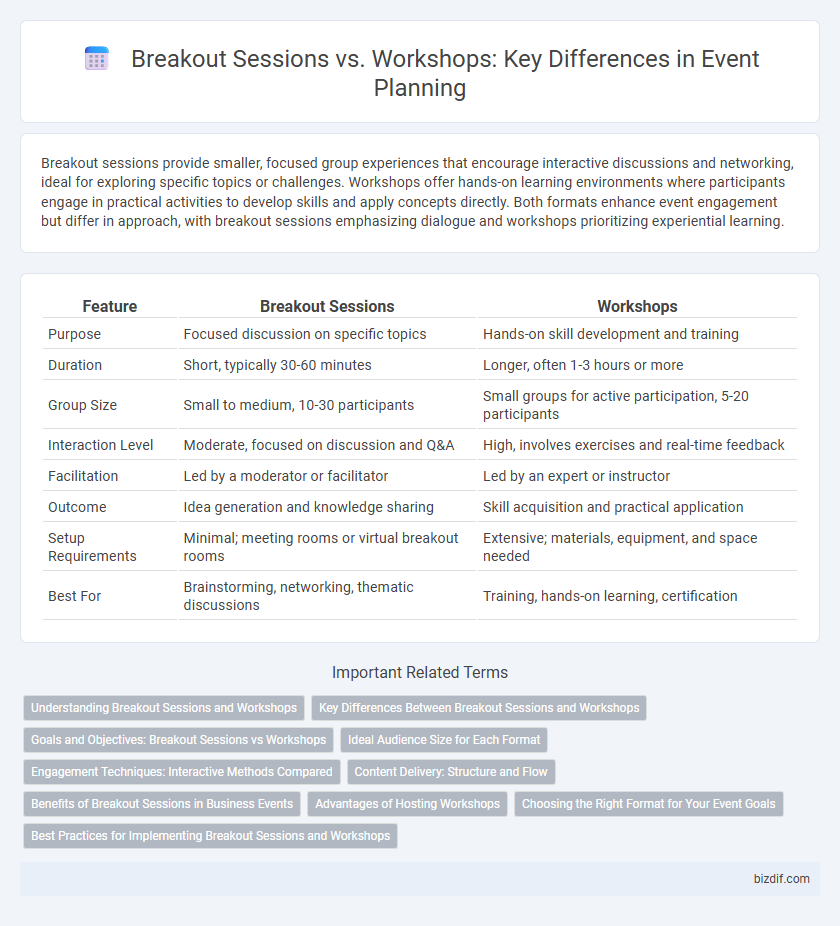Breakout sessions provide smaller, focused group experiences that encourage interactive discussions and networking, ideal for exploring specific topics or challenges. Workshops offer hands-on learning environments where participants engage in practical activities to develop skills and apply concepts directly. Both formats enhance event engagement but differ in approach, with breakout sessions emphasizing dialogue and workshops prioritizing experiential learning.
Table of Comparison
| Feature | Breakout Sessions | Workshops |
|---|---|---|
| Purpose | Focused discussion on specific topics | Hands-on skill development and training |
| Duration | Short, typically 30-60 minutes | Longer, often 1-3 hours or more |
| Group Size | Small to medium, 10-30 participants | Small groups for active participation, 5-20 participants |
| Interaction Level | Moderate, focused on discussion and Q&A | High, involves exercises and real-time feedback |
| Facilitation | Led by a moderator or facilitator | Led by an expert or instructor |
| Outcome | Idea generation and knowledge sharing | Skill acquisition and practical application |
| Setup Requirements | Minimal; meeting rooms or virtual breakout rooms | Extensive; materials, equipment, and space needed |
| Best For | Brainstorming, networking, thematic discussions | Training, hands-on learning, certification |
Understanding Breakout Sessions and Workshops
Breakout sessions provide focused small-group discussions within larger events, enabling participants to dive deeper into specific topics and encourage active engagement. Workshops are hands-on, interactive learning experiences designed to develop practical skills or knowledge through guided activities and real-time instructor feedback. Both formats enhance event value by promoting collaboration and personalized learning, but breakout sessions prioritize dialogue while workshops emphasize skill acquisition.
Key Differences Between Breakout Sessions and Workshops
Breakout sessions typically involve smaller groups within a larger event, designed for focused discussions or activities that encourage participant interaction and idea exchange. Workshops are more intensive, hands-on training sessions where attendees develop specific skills or knowledge under expert guidance. Key differences include the format and depth of engagement, with breakout sessions emphasizing collaborative dialogue and workshops prioritizing skill-building and practical application.
Goals and Objectives: Breakout Sessions vs Workshops
Breakout sessions aim to facilitate focused group discussion and idea exchange, enhancing collaboration and problem-solving within smaller teams. Workshops prioritize hands-on learning and skill development through interactive activities aligned with specific educational objectives. Both formats target engagement but differ in outcome: breakout sessions emphasize dialogue and brainstorming, while workshops concentrate on practical application and mastery of concepts.
Ideal Audience Size for Each Format
Breakout sessions typically suit larger groups of 20 to 50 participants, allowing for diverse discussions within a manageable size. Workshops are more effective with smaller groups of 10 to 20 attendees to facilitate hands-on learning and personalized interaction. Matching audience size to these formats maximizes engagement and knowledge retention in event planning.
Engagement Techniques: Interactive Methods Compared
Breakout sessions leverage small-group discussions and problem-solving activities to boost participant interaction and foster diverse perspectives. Workshops emphasize hands-on learning through practical exercises and real-time feedback, enhancing skill acquisition and retention. Both formats employ interactive methods like brainstorming, role-playing, and collaborative tasks to maximize engagement and deepen understanding.
Content Delivery: Structure and Flow
Breakout sessions typically offer multiple smaller groups engaging in focused discussions or activities, allowing for diverse content delivery with flexible pacing and participant interaction. Workshops emphasize hands-on, skill-building experiences with a structured, step-by-step approach that guides attendees through specific tasks or learning objectives. Both formats enhance event engagement but differ in flow, with breakout sessions promoting exploration and workshops ensuring methodical content mastery.
Benefits of Breakout Sessions in Business Events
Breakout sessions in business events enhance attendee engagement by allowing smaller groups to focus on specific topics, promoting deeper discussions and personalized learning experiences. These sessions foster networking opportunities among participants with similar interests, facilitating collaboration and knowledge exchange. Breakout sessions also increase event flexibility, enabling organizers to address diverse audience needs and boost overall satisfaction.
Advantages of Hosting Workshops
Workshops offer hands-on learning experiences that foster deeper skill development and active participant engagement compared to breakout sessions. They facilitate direct interaction with experts, allowing attendees to ask questions and receive personalized feedback. This immersive format enhances knowledge retention and encourages collaboration, making workshops a highly effective tool for professional growth during events.
Choosing the Right Format for Your Event Goals
Breakout sessions offer focused, smaller group discussions that encourage participant interaction and idea exchange, ideal for networking or exploring multiple topics concurrently. Workshops provide hands-on learning experiences with guided instruction, perfect for skill development and in-depth exploration of a single subject. Selecting the right format depends on event goals: choose breakout sessions to foster collaboration and diverse perspectives, or workshops to deliver practical knowledge and hands-on practice.
Best Practices for Implementing Breakout Sessions and Workshops
Effective breakout sessions prioritize clear objectives, participant engagement, and time management to maximize knowledge retention and interaction. Workshops benefit from hands-on activities, expert facilitation, and structured agendas that encourage skill-building and practical application. Implementing both requires tailored content to audience needs, seamless technology integration, and continuous feedback mechanisms to enhance learning outcomes.
Breakout sessions vs Workshops Infographic

 bizdif.com
bizdif.com